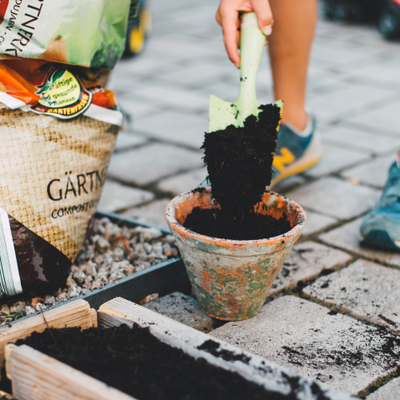Soils ain't soils
by Bruce Beamish, Cancer Council WA Regional Education Officer for the Great Southern
- August 3, 2020
- Leave a comment

Plants need three things: water, sun and soil. Most West Australian soil is low in nutrients and some even repels water. Rich soil full of organic matter and worms will give your plants everything they need to grow, retain moisture better, and help fight infection and insect attack. Your soil needs will partly be determined by what your garden is like, and what you’re planting – so make sure you’ve got your head wrapped around those things too.
Option 1: Buy soil
You can buy bags of soil from garden centres or get it trucked in from landscaping suppliers. If you go with this option, be sure to check the quality of the soil before committing to buy it. This is the quickest option and also the most expensive.
When working with soil, compost and potting mixes, it’s vital to remember that they contain living organisms such as fungus, spores and bacteria. If inhaled, ingested or introduced into the bloodstream, these can be responsible for ailments such as Legionnaires’ disease or tetanus. Wearing gloves, a face mask and sturdy footwear will protect your health while enjoying your soil.
Option 2: Composting
Compost is the best way of adding quality organic matter to your soil (and removing food waste from landfill!) and can be done at home. Check out our composting ‘how to guide’ for a deep dive into composting (ew, gross :P). If you don’t have space for a compost bin, or want to work your way up to it, there’s still plenty you can do!
- Create a worm tube
This is basically a food home delivery system for worms (the best soil improvers!). Drill some holes in a bucket or pipe and bury in your garden bed and top up with kitchen scraps. More detailed instructions are here https://greenskills.org.au/download/worm-tube-instructions/ - Pre-chewed worm food
If you only have a small amount of vegetable scraps and a good food processer, you can put your scraps and egg shells into the blender with a bit of water, dilute the slurry and pour directly onto your garden.
Option 3: Use soil improvers
You can buy manure, fertiliser, compost, soil wetting agents and all kinds of nutrients to add to your soil to improve its quality. If you don’t know where to start, get a friend with a green thumb to have a look at your soil or chat to someone at your local garden centre.
Investing in your soil really pays off. We hope you enjoy getting your hands dirty! We’d love to hear about how your garden grows! Tag the LiveLighter Campaign in your socials (on Facebook, Instagram and Twitter). We’ve also got loads more tips about gardening over here.







